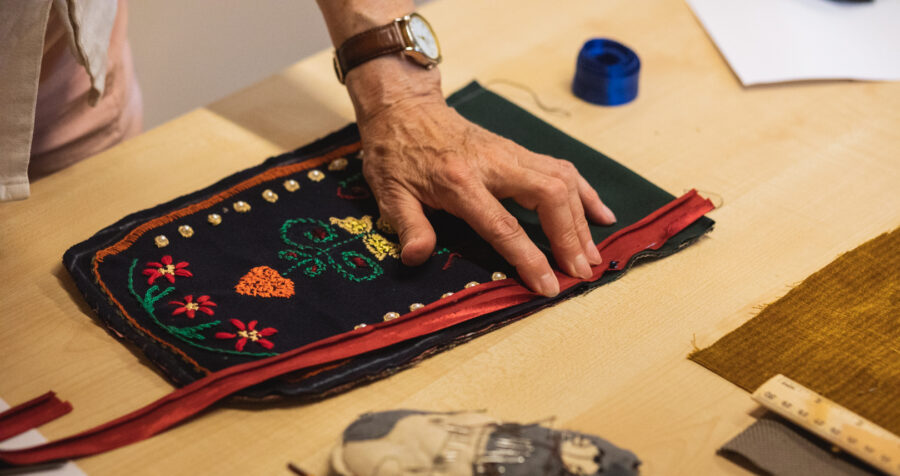Delmonas Crafting Workshops in Klaipėda

Background
Klaipėda City Municipality Centre of Ethnic Culture has been organising workshops for crafting delmonas – textile bags – for a decade. The workshops take 1-3 contact or remote meetings, during which the secrets of the process are learned: embroidery, composition, construction, sewing and the finished delmonas. The workshops are led by experienced masters – artisans, textile artists. Women of all ages, girls, mothers and daughters, and, less frequently, groups of students participate. Some participants only want to learn more about this detail representing the region of Lithuania Minor (Western Lithuania, Klaipėda land), but most often the participants are brought to the workshops by the desire to make a personal textile bag suitable for wearing with national costume, as well as modern clothing or to be given as a gift.

Learning the craft. Photo: © Klaipėda Centre of Ethnic Culture.
Klaipėda Centre of Ethnic Culture has become a major hub for a community interested in the creation and crafting of delmonas. The first workshops were held on the basis of theoretical and practical knowledge of delmonas researcher Dr. Elena Matulionienė, who works at the centre; purposeful dissemination and bringing together of community are constantly ensured. Currently, delmonas making workshops are some of the most sought-after activities of Klaipėda Centre of Ethnic Culture.
Why safeguard? Identifying threats and need for safeguarding
In the ethnographic region of Lithuania Minor, the situation of traditional crafts is the most complicated of all Lithuanian regions. So far, the number of craftsmen who have certified products as national heritage articles and the number of certified masters of traditional crafts is the smallest. Due to the shortage of craftsmen, the peculiarities of the region are disappearing, typical crafts and products are being replaced by simpler products that do not have distinctive features. There is also a lack of more intensive activities of non-governmental organisations and communities in the region, and they are almost non-existent in the field of fostering traditional culture. Traditional culture and culture centres, as well as museums are currently the most popular mediums for bringing together like-minded people, but this does not encourage the emergence of autonomous trends and forms of activity.

Showcasing some of the various patterns. Photo: Klaipėda Centre of Ethnic Culture.
Objectives
The goal of delmonas crafting workshops is to activate the revival and spread of the craft by concentrating and transferring theoretical and practical knowledge and skills. It is very important to promote the craft of textile artist, to encourage craftsmen to make traditional articles, to deepen their knowledge and to apply it in practice. The aim is to help craftsmen and textile artists to transmit knowledge and skills to the community, and to help the community to take over experience from specialists. The participation of grandmothers and granddaughters, mothers and daughters in the workshops is particularly encouraged, thus bringing the tradition back to the family.
How it was done
The activity of preserving the craft of delmonas making is carried out by combining theoretical and practical educational activities. Educational lectures are given in public and virtual space, delmonas exhibitions are held, a register of delmonas makers was created and is constantly updated, methodological video material is created and published, practical delmonas embroidery and sewing workshops are organised.
Delmonas crafting workshops are usually held on the premises of Klaipėda Centre of Ethnic Culture, sometimes on other spaces, and remote meetings are becoming increasingly more popular. The participants of the workshops acquire theoretical knowledge, learn the sequence of work, the combination of ornaments and colours, and make their own delmonas, conveying the characteristics of the colours and patterns of traditional delmonas. The participants take care of the fabrics themselves – delmonas is especially suitable for the secondary use of fabrics and textile pieces. Delmonas sewn from pieces of fabric becomes an item reminiscent of a person’s or family’s history. The women choose how to decorate their handicraft themselves: based on museum samples, they are suggested to create their own ornament and embroider or appliqué in the chosen technique.

Photo: Klaipėda Centre of Ethnic Culture.
Key factors
Fragmented a decade ago, delmonas workshops became permanent, held 2-3 times a year. A community has been formed that delves into the secrets of the textile craft, and the number of artisans who can also be teachers is increasing. Based on the submission of Klaipėda Centre of Ethnic Culture, the delmonas of Lithuania Minor was included in the national Inventory of Intangible Cultural Heritage in 2019, and a register of delmonas makers was created and is constantly updated. In 2020, an open Traditional Costume Gallery was established at Klaipėda Centre of Ethnic Culture, where a master of traditional crafts demonstrates the craft of delmonas embroidery and consults those who want to make their own delmonas.
Delmonas making workshops and additional educational activities are increasingly organised by other fosterers of ethnic culture: Dovilai Centre of Ethnic Culture, Juodkrantė, Kintai, Smalininkai cultural centres, Šilutė Hugas Šojus, Bitėnai Martynas Jankus, Palanga Jonas Šliūpas museums and others.

Photo: Klaipėda Centre of Ethnic Culture.
The future
Delmonas making workshops and additional activities promoting this craft have led to the fact that today this textile item is recognised as a sign of regional identity, women proudly wear delmonas not only with the national costume, but also with modern clothing. Also, increasingly more often, women seek to make delmonas themselves rather than buy one, thus giving it personality and originality. The organisation of general theoretical lectures on delmonas and practical seminars on their making have proved their worth. The audience of listeners and participants is quite diverse. Some are interested in traditional culture in general, others seek specific practical knowledge, secrets of craftsmanship, and others challenge themselves with an introduction to embroidery. However, it is still important to increase the number of artisans-teachers and to stimulate the interest and activity of non-governmental organisations and communities.
